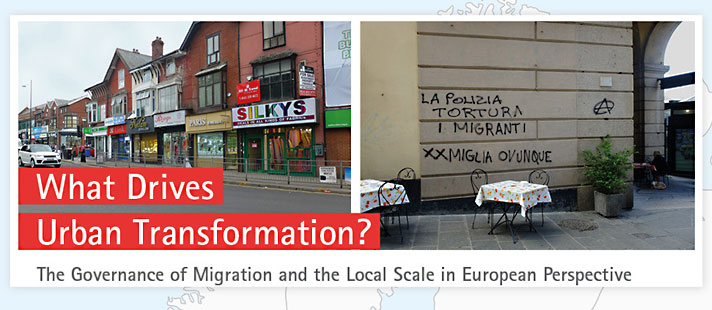Main Content
What Drives Urban Transformation?
The Governance of Migration and the Local Scale in European Perspective

How cities deal with the challenges of migration is one of the major questions of our times. The approaches chosen strongly influence the pace and dynamics of urban transformation. Not only did cities adopt similar housing and labor market policies in response to the influx of new arrivals, and at times deploy soft policy instruments to attract a specific type of labor migrant. Many cities also devised policies to foster the integration of these individuals into the host society. New alliances between civil society, migrant communities and local authorities developed especially with regard to Syrian refugees in European societies. Also in many cities a young generation of individuals, many of whom have an immigrant background, contrasts with predominantly “native” civil servants working in state institutions. Lastly, neoliberalism has contributed to the formation to neighborhoods with a vibrant migrant presence becoming positively re-branded as “diverse” or “multicultural”, thereby becoming subject to gentrification processes. Other migrant neighborhoods, meanwhile, were still considered marginal places. All these changes are tied to a multiplicity of players within the urban fabric. Given this contradictory reality of practices and governance there is no monodimensional conceptual approach that fits the needs of knowledge production in this field. Yet, we feel the need to address the structural dimension of urban transformation in relation to migration.
In this symposium we ask:
- How can we conceptualize different models of urban governance of migration?
- What is the epistemological value of international comparative migration research with a focus on cities?
- In which way do new intra-European alliances impact the organization of local life?
We have invited three outstanding speakers that have delivered cutting-edge empirical research as well as theoretical reflection on these questions. After presenting findings from our current flagship research project “Urban regeneration Practises, Migration and the Production of Socio-Spatial Disparities in European Cities”, we focus on the role of migration in relation to processes of urban transformation. Starting from the heuristic concept of “migration-led regeneration” we discuss the findings of our research on four second-tier, postindustrialized cities with have pursued conspicuous regeneration policies over the past 15 years and each feature immigrant populations. All cities selected different approaches, but faced similar problems when it came to the above mentioned conflicts. We aim to integrate the results of IRS-research into the topical academic debate.

